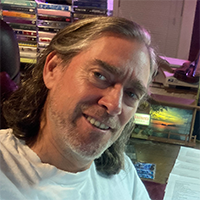 1976
1976
The one time my mother spanked me,
she stopped almost immediately
because she'd hurt her hand. Face cast
downward, she held her right hand out
like an injured jay, cradled in her left.
A wedge of sunlight slipped over the edge
of the window and fell to the white shag carpet
darkening the room. I said, It's going to be okay.
And, for the first time, I felt pity, the one time
my mother spanked me in our living room
in 1976. That same year, in kindergarten,
I made a magnificent cross on a template
cut from cardboard and layered with burnt
wooden matchsticks, learned of my favorite
color, seafoam green, and met a girl
named Sarah-Lynn who, inside a length
of culvert pipe large enough to walk into,
showed me hers and I showed her mine.
A classmate approached me after recess,
told me: I'll slap the far out of you boy!
"far" meaning "fire." Which even then
I knew was his father talking. Such a time!
Laughter had yet to be fully uninvestigated.
On the yellow bus ride home, older boys
told jokes, laughing to each other in turn
like a game. I smiled without knowing why,
listening, determined to memorize a joke,
any joke, before my stop arrived. Oh!
the smell of that bus! Sunlight washed
through the rectangular windows which took
two hands to unlock to lower, its warmth
on new green pleather seats, the industrial
black rubber walkway, the olfactory newness
penetrated me. Exiting the bus, fighting back
a grin, I walked across the street to meet
my mother. With mock seriousness I asked
a question before she could take my hand.
She got down on the hams of her thighs
in her fashionable dark blue bluejeans,
leather high-heeled boots, leveled her eyes
with mine. Her hair frosted and feathered.
Her eyes opalescent, glittering with streaks
of yellow and brown. Why, she said.
Why does Dr. Pepper come in a bottle?
her mouth hinting at possibility of a smile.
Soon as I blurted out the punchline, her face
began melting downward, and in her eyes
I saw something in the distance: a lumbering
yeti, a bigfoot, entered, turned its disapproving
gaze at me, then disappeared. For the first time,
I felt regret. What a day! Pine needles in gutters,
new concrete, new textiles, plastic reek of cut
PVC pipe and I, due a certain punishment.
To my surprise, mom smiled, stood to take
my hand, and walked us back inside.
Now the sun streaks dead insects across
this windshield of a yellow moving truck
filled with all I own: twenty boxes of books,
thirty crates of records, twelve canvases,
three garbage bags full of clothes, two bikes,
two turntables, one unbroken Pearl Beer neon,
and one 1930 Zenith Green-Eye Radio that has
been with me everywhere since leaving home.
I crack the window, breathe in the pine air,
scent of coming rain, aroma of burning brakes
and Gardenia blossoms—I'm at my wedding.
The sky is green and behind me, 800 miles
and five states behind, the same sky seeps
through an old window onto a bed in a third
story brownstone flat where Kate sleeps, her
hand holding onto her phone. Am I surprised
to have seen little traffic, no crashes or cars
on fire by the road? I am. Does the cross
I made still hang at top of the family stairs?
We'll see. Turning on the radio for a song,
I get a request instead: Could you please play
Bad Company by Bad Company, for Emily?
Where these jokes come from, I don't understand.
A sign says, Welcome to Texas, Drive Friendly
and quietly, to myself, I repeat the punchline:
Because his wife left him. No one behind me,
and through windshield wipers' shaky start
I focus on the road. But that noise, vibration
of still-dry rubber up and down, resistance,
sounds like anguish, pain or stifled laugher.
It doesn't really matter, one way or the other,
once the two each begin waving off the rain.








